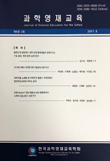대학부설 과학영재교육원 원격수업을 경험한 과학영재들의 과학영재교육원에 대한 기대와 반응 분석
An Analysis of the Expectations and Responses of Science Gifted Students Who Have Experienced Online Lessons at the Science Education Center for Gifted Affiliated with University
- 한국과학영재교육학회
- 과학영재교육
- 제12권 제3호
-
2020.12249 - 263 (15 pages)
-
DOI : 10.29306/jseg.2020.12.3.249
- 118

본 연구는 대학부설 과학영재교육원 중등심화과정 과학반에 재학한 중학교 1학년 56명을 대상으로 과학영재교육원에 대한 기대와 원격수업으로 운영된 모든 프로그램에 대한 반응을 분석하였다. 이를 위해 과학영재교육원 프로그램이 종료한 시점에 설문을 실시하였으며, 설문의 내용은 과학영재교육원에 대한 기대, 과학영재교육원의 수업 진행 방식에 대한 의견, 2020년 진행한 17개 수업 주제별 수업난이도 및 만족도(만족스러운 점/아쉬웠던 점)로 구성되었으며 수업주제별 난이도에 대한 문항을 제외하고는 개방형 설문 문항으로 제작되었다. 설문을 분석한 결과는 다음과 같았다. 첫째, 과학영재들은 원격으로 진행된 블렌디드 수업(콘텐츠 활용 중심수업, 과제수행 중심수업, 실시간 쌍방향 원격수업)에서, 직접 탐구를 통해 해결하는 과제수행 중심수업을 하기 위해 학생들은 콘텐츠 활용 수업으로 제시된 사전 동영상을 반복하여 학습하였고 추가적인 자기주도적인 학습을 통하여 과학 개념 및 원리를 이해하려 노력하였다. 이와 같이 자기 주도적 학습을 통해 해결한 과제는 실시간 쌍방향 원격수업을 통해 확인하고 전문가 및 친구와 소통하는 과정을 통해 그들이 하고자 하는 수업에 맞춰갔다. 둘째, 과학영재교육원에 대한 기대는 크게 학교나 학원에서와는 다른 심화된 수업, 전문가(교수)가 직접하는 수업(39.7%), 실험기기가 제대로 갖춰진 환경에서 다양하고 심화된 실험 활동(42.9%), 친구나 선생님과 대화를 하며 생각을 공유하는 토론/토의(11.1%)이었다. 셋째, 원격수업 환경에서 과학영재들은 어려운 수업내용(23.7%), 과제수행 중 탐구 활동에 대한 어려움(15.7%), 과학영재교육원에서 실험하지 못함(12.3%), 교수님과 친구들과의 상호작용 부족(6.6%)을 아쉬워했다. 하지만, 집에서라도 탐구 활동을 할 수 있고(43.2%), 수업을 통해 지식을 얻고(45.8%), 실시간 수업을 통해 발표·토의활동을 할 수 있는 것에 만족하였다. 이러한 결과를 토대로 과학영재교육원에서의 수업, 실험, 상호작용 요인에 대해 과학영재들의 기대와 반응에 대한 의미를 생각해보고 시사점을 논의하였다.
The purpose of this study was to analyze the expectations for the science education center for the gifted affiliated with university and the responses to all programs operated by online classes. The subjects of this study were 56 7th grade students in the science class in the secondary course of the science education center for the gifted affiliated with university. For this, questionnaires were conducted after all the science gifted education programs were conducted. The contents of the questionnaire consisted of expectations for the science education center for the gifted, opinions on the teaching method of the science education center for the gifted, and the level of difficulty and satisfaction (satisfactory/dissatisfactory) for each of the 17 lessons. Excluding the questions on the difficulty level of each subject, it was produced as an open-ended questionnaire. The results of analyzing the questionnaire are as follows. First, for science-gifted to conduct a task-oriented lessons that is solved through inquiry in online class, students repeatedly learned the lecture video presented as a content-based class, and they tried to understand science concepts and principles through self-directed learning. They confirmed the tasks solved through self-directed learning through real-time interactive online classes, and communicated with professors and friends. Second, the expectation for science education center for the gifted affiliated with university was to have in-depth classes different from those in schools or academies (39.7%), lessons taught by university professors, various and sophisticated experiments in an environment well equipped with experimental equipment (42.9%), and conversation with friends and professors (11.1%). Third, while taking online classes, science gifted students were dissatisfied with difficult content (23.7%), difficulty with inquiry activities during assignment (15.7%), unable to experiment at the gifted education center (12.3%), and lack of interaction with professors and friends (6.6%). Based on these results, the meaning of the expectations and responses of science gifted students to the factors of instruction, experimentation, and interaction at the science gifted education center was considered. In addition, the implications for the curriculum management process of the science gifted education center affiliated with the university were discussed.
Ⅰ. 연구의 필요성
Ⅱ. 연구 방법
Ⅲ. 연구 결과
Ⅳ. 과학영재들의 대학부설 과학영재교육원 프로그램 반응에 대한 논의
Ⅴ. 결론 및 제언
참고문헌
(0)
(0)